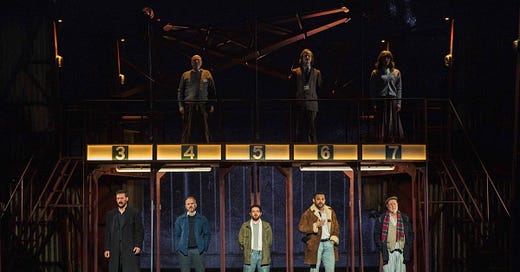Shouts and Murmurs - June 4, 2024
Your last Shouts and Murmurs until September because Edinburgh Fringe. ACE, Baillie Gifford, Edinburgh International Book Festival, reviews, interviews, and the hunt for a legendary copy of Hamlet.
Hello, and welcome to Shouts And Murmurs, a weekly email for paid supporters of The Crush Bar, written by me, Fergus Morgan.
Every week, I round up the best theatre writing elsewhere - reviews, interviews, opinion, long-reads - plus any other interesting or inspiring theatre stuff I find. At the moment, you can read the top section for free, but you have to pay me £5/month or £50/year - or just email me, if that seems a bit steep - if you want to read the quality content on the other side of the paywall.
This week: funding angst in England and Scotland; a round-up of the reviews of Boys From The Blackstuff, Eddie Izzard’s solo Hamlet, and other shows; and a bunch of links to interviews - Anna Maxwell Martin! Thalissa Teixeira! Nicole Cooper! - and other interesting articles, including a brilliant one in The FT about the hunt for a legendary copy of Hamlet.
Thanks for reading The Crush Bar, as always. If you want to do me one more favour, then you can share this newsletter far and wide and encourage others to subscribe via the button below.
Previously in The Crush Bar:
This will be the last issue of Shouts and Murmurs for a few months.
That is because, after Friday’s regular newsletter, The Crush Bar will be going on hiatus for a month or so while I head off to Canada to either hike in the awe-inspiring Rocky Mountains or cower from ferocious wildfires for a fortnight. When it returns, this newsletter will be firmly focused on the Edinburgh Festival Fringe when it returns in mid-July. For those of you new here - a good 1200 of you since this time last year! - things work a bit differently during July and August, when the world’s largest arts festival arrives on my doorstep and regular newsletters are replaced by expert show recommendations. I will make sure there is some sort of exclusive content for paid supporters, too, although I’m not sure what that will look like yet. Wait and see.
One more bit of newsletter stuff. Over the weekend, The Crush Bar reached - and then passed! - a century of paid supporters. There are now 101 people who think this endeavour to platform emerging theatremakers and discuss the issues that matter to them is worth £5/a month or £50/year. If you think so, too, you can join them here.
Enough admin. What has been happening? Well, there is a lot of discourse about funding flying around. In England, it is connected to Dame Mary Archer’s review of Arts Council England, the future of which has now been thrown into doubt by Rishi Sunak calling a general election. Let’s Create, the decade-long ACE strategy that was launched in 2020, is at the heart of it: some critics, like The Times’ Richard Morrison, say Nicholas Serota and Darren Henley have sacrificed excellence for inclusivity, and siphoned money away from Big Institutions doing Good Art to push what he labels the “most wokeish of woke” agendas via smaller organisations; others, who actually work in the arts and know what they are talking about, are broadly keen on Let’s Create and its ambition to widen access to the arts, but have more practical concerns, chiefly centring on the onerous reporting obligations ACE puts the organisations it funds under and the unfit-for-purpose application portal it makes them use, Grantium.
Ask yourself who the real philistines are here. The hard-working arts industry professionals with direct experience of working with ACE and grappling with ever-diminishing budgets to ensure as many people as possible can access culture? Or the loud political commentators intent on removing nuance from the situation and weaponising ACE in the all-consuming culture wars, grabbing the quango and desperately hurling it at “woke” like a kid in a food fight? As always, Lyn Gardner:
“Whatever some might think, excellence has not slipped off ACE’s agenda since the introduction of Let’s Create. The increasing number of artists making co-created work are no less talented, skilled and creative than those reviving work from the canon. Is the work that playwright Chris Bush made with the National Theatre’s Public Acts any less artistically excellent than her other work including Standing at the Sky’s Edge, currently in the West End? Surely not, and one informs the other. The idea that you can either make community work or work at the National belongs in the ark and doesn’t reflect the world we live in.”
The funding fun continues here in Scotland, with Baillie Gifford and the Edinburgh International Book Festival going their separate ways after sustained campaigning from Fossil Free Books and others over the former’s investment in companies with ties to the fossil fuel industry and Israel’s defence, tech and cybersecurity industries. I mention this because it has repercussions for other Scottish arts organisations sponsored by the investment management firm, which is basically all of them.
Some people are happy about it. Some people are not, arguing that Baillie Gifford are not bad guys and that a lot of arts organisations would struggle without their support. I have time for the perspective of anyone whose top priorities are the survival of our planet, of Palestine, and of culture in this country. I have sympathy, too, with those running cash-strapped arts organisations. I have less sympathy with those whose priority is profit, professionally mandated or otherwise, or stoking division for clicks.
What we really need is an enlightened and compassionate public discourse on these thorny questions around the ethics of corporate sponsorship, but will we get one?
It seems unlikely: even Baillie Gifford’s spokesperson Nick Thomas eschewed professionalism in favour of a bizarre statement berating “anonymous” activists, ignoring the fact that they all put their name to a very well-publicised open letter. No, serious reflections that avoid bad-faith portrayals of Fossil Free Books as bullies, avoid the patronising and obfuscating “investing is hard” argument, and avoid grabbing the book festival like a banana skin to hurl in the culture wars food fight - seriously, you cried because a corporate sponsor pulled out of a festival? - are hard to find. The most compelling pieces I found are from Kevin Williamson in Bella Caledonia, who signed the letter, and from Esa Aldegheri in The Herald, who did not. I agree with Aldegheri, from her sympathy for both serious sides of the debate…
“There is urgency in the petitions circulating to reverse this diminishment of places where people can gather to share and enjoy art, where opinions can be exchanged to help inform choices. There is urgency in the demands of Fossil Free Books. There is urgency in the calls for solidarity of my friends and colleagues in Gaza. How do we navigate these urgencies without destroying what sustains our capacity for collective thinking and debate? How can we stop our calls for justice from forcing our festivals to close?”
To her correctly laying the blame for this whole situation at the door of the Scottish government and its appalling mistreatment of Scotland’s arts industry recently…
“This is a matter of morals and of money. We live among the ruins of austerity politics whose result is the appalling scarcity which forces festivals and cultural venues to rely on private funding in order to survive. And this scarcity, of course, generates conflict. It is immensely frustrating to see writers, ‘book workers’ and festivals pitted against each other, sparring online, issuing ultimatums - as if they are antagonists. The real antagonists are these brutal funding systems which risk leading to cultural impoverishment instead of enriching exchange.”
“How did we arrive at this point, where festivals rely on private donors to the extent that they risk closure if this funding ends? Where have Scottish Government and local council investments been in this slide towards Scotland becoming one of the worst-performing countries in Europe when it came to arts spending per head of the population?”
To her concluding call for a constructive conversation to emerge from this mess…
“Whatever happens next, writers, ‘book workers’ and book festivals urgently need to work together towards dialogue and solutions. May we step back from the language of ultimatums, blame, shame and resentment. May we use words to generate open conversations which help us imagine better futures. May we protect the spaces that make such conversations possible.”
Whether such an honest, measured, caring conversation will emerge over Baillie Gifford, or over ACE, we will see. I doubt it, not when there are ill-founded accusations of cultural vandalism to throw around like rotten tomatoes. Let me know, though. I will not be scrolling Twitter to check while I tramp around the Rockies.



